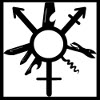 Posted by kaberett
Posted by kaberett
Hello: my name's kaberett, and English is my second language.
Wait: that's misleading.
My name's kaberett, and English is my primary language.
To give you the full story needs a bit more than a one-sentence introduction in the style of twelve-step programmes. Let's try again: my name is kaberett, and I'm a third-generation immigrant. I was born and raised in the UK; I spoke only German until I was about two and a half; and for complicated and tedious reasons I wasn't allowed to speak any German at all between the ages of six and about eleven.
I don't sound Austrian when I speak English; I don't sound English when I speak German. My proverbs and my nursery rhymes and the stories of my childhood are all in German, up until you run abruptly up against Robin Hood and the Hobbit. But my grammar, and my abstract thought, and my pronouns? They're in English.
My life is bilingual, liminal; my adulthood is, ignoring food, English. It is RP; it is university-educated; it is a disguise, but it does not ring hollow; it is only half the truth, but it is not a lie.
In English I am they; I am genderqueer; I am trans* and queer and I am assertively - aggressively - ungendered, or rather: I am gendered, and it is neuter.
I don't know how to occupy that space in German. I don't even know how to translate queer, with its reclamation and its political charge and its I'm-here-get-over-it, with its oddity and slyness and gentility.
Auf Deutsch I can be sie or er. I don't know how to occupy the space of they: of it, of es: I could, perhaps, refer to myself as mann - one - and force every descriptive noun, every adjective, into the neuter. Not der Lehrer, die Lehrerin: das Lehrer, the teacher, perhaps? But even there, I'm norming the masculine form of the noun.
I don't know how to navigate these waters.
But here is something I can say, can say loud and clear: I might not know how to occupy neutral space in my mother tongue, but at least it is honest about gendering within a binary. At least it is upfront.
No subliminal associations with teacher, doctor, engineer, nurse; no (s)he, no hero(ine): no. We will not relegate the feminine to a parenthetical adjunct to the masculine, an afterthought or grudging concession. Our noun classes are gendered, to be sure, but we have a choice in how to express that. Is the feminine marked? Yes: it is, with suffices to the masculine, but they are not parenthetical.
Schau mal, see here: die LehrerInnen; die Lehrer/innen. The teachers. Women need not be relegated to the position of cramped marginal notes: the feminine can occupy equal space, equal time, on the page. We need not soften her, nor encircle her in chains.
I don't know how to describe myself in German, but here's something I can ask you to do in English: if you must use language that asserts a binary of gender, please don't give the masculine primacy.
Instead, take a leaf out of a cousin's book: s/he, not (s)he. Hero/ine, instead of hero(ine).
If - when - we're pushed into the margins -- we don't have to stay there. We can take out our fountain pens, our marker pens, our spray-cans, our crayons, and we can say:
We are here. Get over it.
As a battle cry, it is perhaps true that librarians and book-herders miscellaneous are the only people likely to be taken faint with horror. But: we can fight this on our own terms, quietly, one by one and word by word.
Let's try it.

Heh, I made it here belatedly via the Asexual Agenda. Being German myself, I thought I'd add my two cents.
ReplyDeleteAs to "queer", it does get some use in German, though most people wouldn't know what to do with it. I personally prefer "quer", which has the implication of "verquer", but that variety seems to be something that nobody but a friend and I like. (Besides, "queres Volk", heh)
I can't chip in about the gender-descriptors, though. Mostly, they seem to get imported from English.
As to pronouns, I've seen nin (nimse/r, nim, nin), sier (siene/r, siem, sier) and xier (see sier) discussed, and on my blog, I try to use sier.
Otherwise, thanks for the post - it made me think yet again about the good and the bad sides my mother tongue has.
THANK YOU. This is amazing, and I shall treasure it and love it and learn from it (also, "quer" is fantastic, I AM KEEPING THAT).
DeleteI was pointed here yesterday via a comment thread on kaberett's blog, and wanted to thank you as well for your thoughts and the information on gender neutral pronouns. It's super useful and it's been hard to find anywhere else - I think perhaps I'm just not as confident searching on the German web. Thanks also for introducing me to your very interesting blog. :)
DeleteMy situation is quite similar to yours, except I first spoke German until about 7 years old, and then we spoke only English in the house (in Canada). I am 32 years old now, and I am re-learning German. I am genderqueer/non-binary as well, and it is immensely frustrating how obsessed the German language is with Gender. Language informs us about our world, and shapes our perceptions - gendered language is a barbaric way to shape our minds - in my opinion.
ReplyDeleteThank you for addressing this in English - it's encouraging to know that others are struggling with this, and trying to find ways to exist as themselves in the midst of a language that doesn't acknowledge them.
Also, Quer is fantastic, and I am totally using it :)